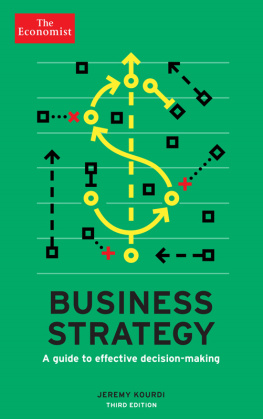BUSINESS STRATEGY
JEREMY KOURDI is an executive coach, writer and co-founder of Entendo (www.Entendeo.com). He has worked with many well-known organisations in the UK and internationally, including The Economist, IMD Business School in Lausanne and the Chartered Management Institute. He has an MA in International Relations and is the author of numerous business books and articles.
OTHER ECONOMIST BOOKS
Guide to Analysing Companies
Guide to Business Modelling
Guide to Business Planning
Guide to Cash Management
Guide to Commodities
Guide to Country Risk
Guide to Decision Making
Guide to Economic Indicators
Guide to Emerging Markets
Guide to the European Union
Guide to Financial Management
Guide to Financial Markets
Guide to Hedge Funds
Guide to Investment Strategy
Guide to Management Ideas and Gurus
Guide to Managing Growth
Guide to Organisation Design
Guide to Project Management
Guide to Supply Chain Management
Numbers Guide
Style Guide
Book of Business Quotations
Book of Isms
Brands and Branding
Business Consulting
Buying Professional Services
The Chief Financial Officer
Economics
Frugal Innovation
Intellectual Property
Managing Talent
Managing Uncertainty
Marketing
Marketing for Growth
Megachange the world in 2050
Modern Warfare, Intelligence and Deterrence
Organisation Culture
Successful Strategy Execution
Unhappy Union
Directors: an AZ Guide
Economics: an AZ Guide
Investment: an AZ Guide
Negotiation: an AZ Guide
Pocket World in Figures

BUSINESS STRATEGY
A guide to effective decision-making 3rd edition
Jeremy Kourdi

Business Strategy
A guide to effective decision-making
3rd Edition
Jeremy Kourdi
PublicAffairs
New York
The Economist in Association with Profile Books Ltd. and PublicAffairs
Copyright The Economist Newspaper Ltd, 2015
Text copyright Jeremy Kourdi, 2015
First published by Profile Books Ltd. in Great Britain.
Published in 2015 in the United States by PublicAffairs, a Member of the Perseus Books Group
All rights reserved.
Printed in the United States of America.
No part of this book may be reproduced, stored in or introduced into a retrieval system, or transmitted, in any form or by any means (electronic, mechanical, photocopying, recording or otherwise), without the prior written permission of both the copyright owner and the publisher of this book, except in the case of brief quotations embodied in critical articles and reviews. For information, address PublicAffairs, 250 West 57th Street, 15th Floor, New York, NY 10107.
The greatest care has been taken in compiling this book. However, no responsibility can be accepted by the publishers or compilers for the accuracy of the information presented.
Where opinion is expressed it is that of the author and does not necessarily coincide with the editorial views of The Economist Newspaper.
While every effort has been made to contact copyright-holders of material produced or cited in this book, in the case of those it has not been possible to contact successfully, the author and publishers will be glad to make amendments in further editions.
PublicAffairs books are available at special discounts for bulk purchases in the U.S. by corporations, institutions, and other organizations. For more information, please contact the Special Markets Department at the Perseus Books Group, 2300 Chestnut Street, Suite 200, Philadelphia, PA 19103, call (800) 8104145, ext. 5000, or e-mail special.markets@perseusbooks.com.
Library of Congress Control Number: 2015934934
ISBN 978-1-161039-476-5 (PB)
ISBN 978-1-161039-477-2 (EB)
First Edition
10 9 8 7 6 5 4 3 2 1
PART 1
BUSINESS STRATEGY is the plans, choices and decisions used to guide a company to greater profitability and success.
An inspired and clearly considered strategy provides the impetus for commercial success, whereas a weak or misunderstood strategy may lead to a company going out of business. Understanding what constitutes strategy is therefore crucial in developing a successful business, as is avoiding the tendency to label every plan and decision strategic when most are about implementing strategy rather than setting it. Equally important is for a strategy to be clear and effectively communicated to everyone with a role in implementing it, and to shareholders and other stakeholders.
A focus on strategy will highlight where a unit or group of businesses can be more successful as well as those areas where it is weak, vulnerable or failing. It will show in detail where the business is making its money and why. This insight can be used to build profits, cash flow growth and shareholder value. Strategy indicates where resources (notably people, effort and finance) should be concentrated.
The process of developing and implementing strategy enables managers to understand their customers and competitors. Specifically, a sound strategy is grounded in an understanding of a businesss customers. This understanding is dynamic the company is able to develop its products and approach in line with its customers changing preferences. Some of the strategies pursued by market-leading companies such as Microsoft and Apple involve anticipating what their existing and potential customers will like. Few purchasers of the Apple iPod were demanding a stylish new way to buy, download and play music before it was launched. Instead, Apple was able to combine developments in software, design, the internet and computer-chip miniaturisation with its understanding of what people would value to come up with a surprising product that caught the popular imagination.
Developing and implementing strategy strengthens a business in another important way. It makes sure that resources are devoted to the most important customers in order to retain their loyalty and get them to buy even more of the companys products or services.
Strategy helps to highlight how profits can be increased through the development of product extensions (new products based on existing offerings), changes to the product mix (the range of available products so that they complement each other), adjustments to prices or cuts in costs. The process of developing strategy also informs thinking about which products and markets to abandon.
Another benefit of strategy relates to developing and implementing a firms internal organisation. A clear strategy shows managers where business skills need to be added or strengthened. It also highlights where productivity can be improved and why particular initiatives and activities have succeeded or failed. Above all, a clear strategy gives a company the impetus and focus needed to develop among its employees the culture, attitude and skills required to meet the needs of its customers profitably and in a rewarding way.
A businesss strategy provides a guiding view of the future that influences employees decisions, priorities and ways of working. People like to do work that is meaningful to them and that has a purpose. Strategy should provide that meaning and purpose. Those responsible for setting a businesss strategy often lose sight of the intangible and valuable contribution it can make to employees commitment, engagement, productivity and creativity. People work better and achieve more if they believe in what they are doing and have confidence in the direction they are going. Conversely, uncertainty or insecurity about the future breeds tension, lack of confidence and even cynicism, none of which are conducive to business success or personal achievement. A strategy that employees understand and believe in will help them develop their potential and attain new skills. In turn, this boosts self-confidence and increases self-awareness, both of which are qualities that intelligently managed companies need more of.
Next page










